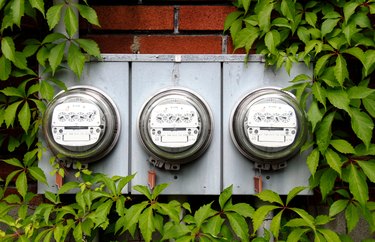
Sometimes your electricity usage increases because the winter is unusually cold, the summer is very hot or you've added a hefty load such as a hot tub. If a spike in your electricity bill is unexplained -- if nothing unusual has happened, your meter is accurate, and you haven't changed anything -- you may be paying too much. If your bill has spiked, something is wrong. You have to look for the problem.
Reasons for a Spike
Video of the Day
If your electricity bill becomes unusually high, the meter may be faulty and you should ask your utility to check it. If the meter is accurate, an appliance or other load may be using more power than usual. Start by checking the systems that use the most power to see if they are working properly and if they are switching on and off normally. Keep track of your daily power consumption by reading your meter to see the effect of changes you make during your investigation.
Video of the Day
Heating and Cooling
Your heating or air conditioning systems may be staying on longer than usual because of extreme weather or because of failing components. You can check how much power your climate control system is using with a clamp-on watt meter, placing the clamp around the electrical connection and comparing the power used with the rated power listed on the unit nameplate. If the system is using rated power, ducts may have leaks or the thermostat may be broken, causing the unit to run longer. Check seals around doors and windows for gaps that may have developed, and look for hot or cold drafts that may be causing the problem.
Increased Hot Water Use
After heating and cooling, your next largest load is an electric hot water heater. The unit heats with simple resistances that can't malfunction to increase the power, but your power spike might be due to increased hot water use. Check hot water taps for dripping, and monitor your washing-machine and dishwasher cycles to make sure they are working properly and they don't keep the hot water on when it's not needed. Check the setting on your hot water tank thermostat, and measure your hot water temperature with a thermometer to make sure it matches the setting.
Other Loads May Use More Power
Refrigerators and freezers may draw excess power, or they may have to work longer than necessary due to a leak in the door gasket. Use a watt meter to check the power usage of appliances against the rated power on their nameplates. If all your loads are using only rated power, your spike is caused by a load staying on for an unusually long time. Unplug your loads one at a time or open their circuit breaker for a day, and keep careful track of the reading on your power meter. Peaks in the readings can help you find the load that is staying on and using a lot of power over an extended period. Outdoor lighting may be a cause of high electricity use -- bulbs may be staying on because their timers or photocells have failed.